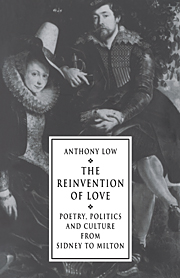Book contents
- Frontmatter
- Contents
- Preface
- Introduction
- 1 Sir Philip Sidney: “huge desyre”
- 2 John Donne: “Defects of lonelinesse”
- 3 John Donne: “the Holy Ghost is amorous in his Metaphors”
- 4 George Herbert: “the best love”
- 5 Richard Crashaw: “love's delicious Fire”
- 6 Thomas Carew: “fresh invention”
- 7 John Milton: “Because wee freely love”
- 8 John Milton: “Haile wedded Love”
- Conclusion
- Notes
- Index
3 - John Donne: “the Holy Ghost is amorous in his Metaphors”
Published online by Cambridge University Press: 02 October 2009
- Frontmatter
- Contents
- Preface
- Introduction
- 1 Sir Philip Sidney: “huge desyre”
- 2 John Donne: “Defects of lonelinesse”
- 3 John Donne: “the Holy Ghost is amorous in his Metaphors”
- 4 George Herbert: “the best love”
- 5 Richard Crashaw: “love's delicious Fire”
- 6 Thomas Carew: “fresh invention”
- 7 John Milton: “Because wee freely love”
- 8 John Milton: “Haile wedded Love”
- Conclusion
- Notes
- Index
Summary
It is a “widely publicized observation that Donne expresses religion through human love,” as Winfried Schleiner has remarked. In a sermon preached before the King at Whitehall on 24 February 1625/26, Donne indicates why he found the language of sexual love appropriate in speaking about divine matters:
And would GOD pretend to send thee a gracious Messadge, and send thee a Divorce? GOD is Love, and the Holy Ghost is amorous in his Metaphors; everie where his Scriptures abound with the notions of Love, of Spouse, and Husband, and Marriadge Songs, and Marriadge Supper, and Marriadge-Bedde. But for words of Separation, and Divorce, of Spirituall Divorce for ever, of any soule formerly taken in Marriadge, this very word Divorce, is but twice read in the Scriptures; once in this Text; and heere God dis-avowes it; For when hee sayes, Where is the Bill, hee meanes there is no such Bill.
There is ample biblical precedent in speaking about both the love between God and man and the love between God and his Church in sexual and marital terms. In this instance, Donne's sermon speaks of an indissoluble marriage between God and the soul. And, of course, although he invokes the authority of the Bible directly here, there is also an ancient tradition of writings based on these originary biblical metaphors – hermeneutical, theological, devotional, and literary – on which Donne also drew.
- Type
- Chapter
- Information
- The Reinvention of LovePoetry, Politics and Culture from Sidney to Milton, pp. 65 - 86Publisher: Cambridge University PressPrint publication year: 1993



